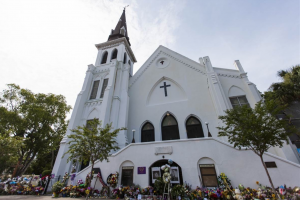In a comment posted on Facebook in response to former South Carolina Governor Nikki Haley’s recent remarks on Blaze TV (reported in Rolling Stone Magazine), someone wrote, “Dylann Roof is an anomaly.” Haley, former U.S. Ambassador to the United Nations under Donald Trump, told Blaze on-air host Glenn Beck that “people saw the Confederate flag as service, and sacrifice, and heritage” before White supremacist Dylann Roof “hijacked” it when he killed nine Black people at the Emanuel African Methodist Church in South Carolina in 2015.
Here’s my response: Dylann Roof is a mass murderer consumed with hatred toward Black folk, plain and simple. The dictionary uses the following synonyms for the word anomaly:
oddity · peculiarity · abnormality · irregularity · inconsistency · incongruity.
Dylann Roof is no anomaly. His heinous acts are the manifestation of the normalized dehumanization of Black people that resulted in thousands of lynchings and were institutionalized in the Deep South. They grow from a profound abhorrence of Black success and an irrational fixation on White supremacy.
Social attitudes that helped undergird this system existed throughout most of the 20th century, and were accompanied by an extra-judicial code, known as “Jim Crow,” of accepted social rules and customs aimed at subjugating Black folk – America’s brutal Western counterpart to South African Apartheid-based racism. Its practices sanctioned killings and domestic terrorism of Black people while advancing a warped morally bereft belief that “Blacks had no rights a White person was bound to respect.” These precise words were included in summation of the U.S. Supreme Court’s ruling in Plessy V. Ferguson, one of the most egregious miscarriages of justice ever sanctioned by the nation’s highest court, enabling a system that for the next 68 years supported the fallacy of “Separate but Equal.” Thus an unjust system supported by law further normalized a social order, establishing that segregation was constitutional if Black and White facilities were equal.
These attitudes were pervasive and reinforced efforts to deny Blacks equal opportunity and protection under the law. The Separate but Equal Doctrine was only struck down as untenable and unconstitutional by enactment of subsequent rulings in Brown V the Topeka Board of Education 1954 and the Federal Civil Rights Acts of 1964 and 1968.
Throughout most of the 20th century violent racist and KKK domestic-terrorist attacks have surfaced in the form of church bombings, assassinations, lynchings, mass incarceration, and numerous documented racially disproportionate flagrant abuses of Black citizens at the hands of law enforcement, evincing wide-spread disregard for Black lives. This irrefutable history begs the question: How could former South Carolina Governor Nikki Haley be so ostensibly deficient in her grasps of the historical issues affecting Blacks? What personal cultural context may lend to such a “blind-spot,” conjuring her unartful discourse surrounding race relations describing mass murderer Dylann Roof? Is her analysis informed by her own earlier acculturation as a young immigrant coming of age within the racially intensive caldron of Southern racial politics? It’s entirely plausible that Nikki Hayley lacks the empathy or sensitivity to connect with slavery’s residual impact on a visceral personal level beyond the symbolism of monuments.
Despite being ethnically Indian and Punjabi, Ms. Haley’s formative years apparently failed to adequately educate her regarding the American South’s actual social construct of race, color, and caste as distinctively different from traditional India. Haley’s observation is drawing criticism from critics attentive to her every utterance as an aspirant to higher public office in 2020 and ensuing election cycles. Her statement reveals a deafness to history and social psychological dimensions of racism in the Deep South and the nation at large, or is political pandering to Trump’s far-right ultra-conservative base.
Consider that Haley’s formative years were spent in the academic halls of one of South Carolina’s prestigious predominately White private schools, Orangeburg Prep. As late as 2007, the Orangeburg public school system was 90% Black, while Orangeburg Prep was still 95% White. One might reasonably argue that Nikki Hayley’s politics and social construct of race differ sharply from Southern Blacks. As a Southeast Asian minority woman, no doubt Ms. Haley is well acquainted with the legacy of race, caste, color, and gender discrimination as social constructs pregnant with social stigma. What Ms. Haley seems to pathetically lack is antipathy toward proponents of the “Lost Cause” ideology that sought to change the Civil War narrative.
Almost immediately after the war ended in 1865, the defeated Southern states had to form a coherent reason why they had engaged in a rebellion against the Union. Such reason could not highlight the centrality of slavery to the Southern cause, but instead had to minimize, or even deny, the role of slavery. It would appear that Nikki Haley has surveyed the political terrain and calculous within the nation and her state, South Carolina, and is hedging all bets that Trump’s coat-tails and base will reap greater political dividends for her higher aspirations than supporting the narrative surrounding the Confederacy and the “Lost Cause” and truth telling about the nation’s racial history. D.Day Media 2019
